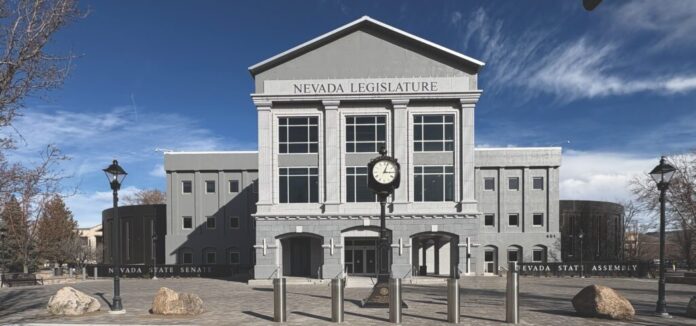Tesla’s Gigafactory: Economic Growth and Legislative Changes in Storey County
When Tesla decided to construct its first gigafactory in Storey County, Nevada, around ten years ago, it made a bold promise to invest $3.5 billion into the local economy. This commitment sparked excitement not only within the company but throughout the state, as it signaled the potential for extensive job creation and industrial growth.
A Sweet Deal for Tesla
In exchange for this substantial investment, Tesla received significant tax benefits—specifically, a 10-year tax abatement on property taxes and the Modified Business Tax, alongside a 20-year abatement on sales tax. These incentives played a crucial role in attracting Tesla to Storey County, and they marked a significant victory for then-Governor Brian Sandoval’s administration in the competitive landscape to secure high-value investments.
Since the establishment of the gigafactory, Storey County has witnessed a remarkable transformation. The influx of jobs created by Tesla, which ranges from direct employment to indirect opportunities, has uplifted the economy of the Reno/Sparks metro area. The success of Tesla has also paved the way for other corporate giants, such as Google, Switch, and Panasonic, to establish operations in the region, resulting in the Tahoe-Reno Industrial Center becoming the largest industrial center in the U.S. and the third largest globally.
The Good Neighbor Policy
Tesla’s relationship with Storey County appears to have gone beyond simple business transactions. Recognizing that its substantial operations would impose strain on local infrastructure and services, Tesla proactively collaborated with local officials to initiate improvements. The electric car manufacturer participated in discussions to allocate resources towards enhancing roads, traffic management, and ensuring the adequacy of fire and sheriff protection, as noted by Storey County Manager Austin Osborne.
This cooperative approach was particularly critical given Storey County’s small size—home to only about 4,000 residents—making it challenging to accommodate the demands of such a significant industrial player like Tesla. The "good faith" agreement facilitated a solution to immediate infrastructure needs without taxing the county’s limited resources. However, this arrangement also meant that Storey County would need to wait a decade before generating tax revenue from Tesla.
Anticipating Future Challenges
Despite the successful partnership with Tesla, Storey County is now facing concerns regarding the behavior of future corporations that may seek similar tax abatements. To address these worries, the county is leading the charge on proposed legislation aimed at ensuring that any future companies qualifying for Nevada’s two largest tax-abatement levels—those promising investments of $3.5 billion or $1 billion—would be required to contribute towards funding public services that would be impacted by their presence.
Currently, under existing Nevada law, companies applying for these top-tier tax abatements are not obligated to negotiate agreements addressing the additional costs incurred by local governments. This gap in accountability has driven Storey County to introduce Senate Bill 69, which is designed to create a more amicable framework for negotiations, allowing local governments to negotiate agreements that offset the costs associated with accommodating large corporations.
Legislative Progress
Senate Bill 69 has received initial approval from the Senate Revenue and Economic Development Committee and is still advancing through the legislative process. This bill represents a significant shift in how Nevada anticipates future economic growth and corporate responsibility. Austin Osborne highlighted that the bill aims to ensure that stakeholders, including local governments, have a seat at the negotiation table to proactively address their needs.
Through this legislative initiative, Storey County hopes to carve out a model that allows for mutually beneficial agreements between the state and the companies it seeks to attract. Osborne emphasized that different counties have unique circumstances and that while Storey County might have been well-positioned to negotiate with Tesla, future entities might not follow the same ethical path.
A Call for Community Input and Collaboration
One of the key components of SB 69 is that it would empower local fire departments and other essential services to participate in negotiations regarding tax abatements. As it currently stands, fire departments lack any authority to engage in discussions about the requirements needed to safeguard the investments of large corporations. According to Osborne, this lack of input diminishes their ability to ensure adequate resources for addressing emergency services adequately.
The implications of this topic extend far beyond Storey County. If the bill passes, it could assist counties throughout Nevada, such as Esmeralda and Humboldt, that may also attract large investments in the future. This forward-thinking approach suggests a commitment to not just economic expansion, but to responsible governance and community development.
Diverse Perspectives on SB 69
Reactions to Senate Bill 69 have varied across the political spectrum and among local stakeholders. Supporters, including the Professional Firefighters of Nevada and the Nevada Association of Counties, view the legislation as essential for securing adequate resources and maintaining public safety during economic transitions. Conversely, groups like the Las Vegas Global Economic Alliance and certain chambers of commerce have expressed concern, arguing that the existing process for tax abatements has effectively drawn businesses to Nevada and that there is no need to alter a system perceived as functional.
Local municipalities such as the City of Fernley, which sits near the TRI Center, have also voiced opposition to the proposed bill. Fernley lobbyist Mendy Elliott recently questioned the need for change, arguing, “If it isn’t broken, we are trying to understand what Storey County is trying to fix.”
In summary, Storey County’s legislative developments regarding tax abatements reveal a complex interplay between economic growth, corporate accountability, and community impact. The fate of Senate Bill 69 and its implications for future large-scale investments in Nevada remains a significant topic of discussion among lawmakers and residents as the state navigates its pathway forward in the evolving economic landscape.
